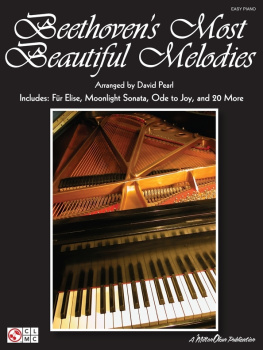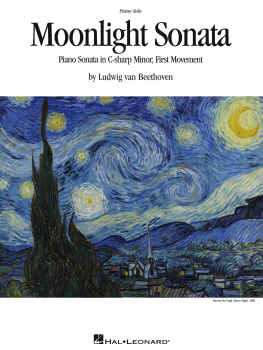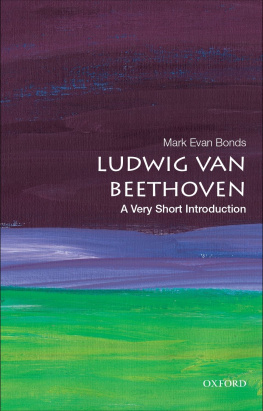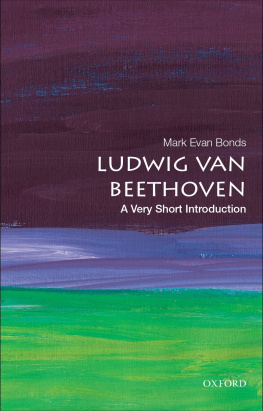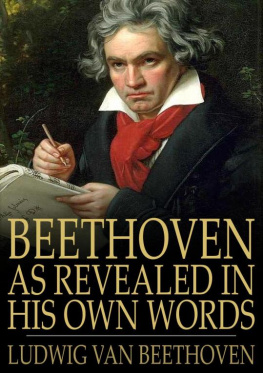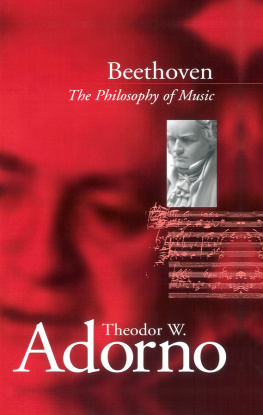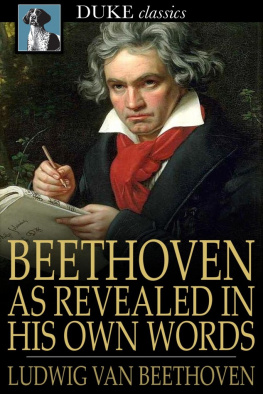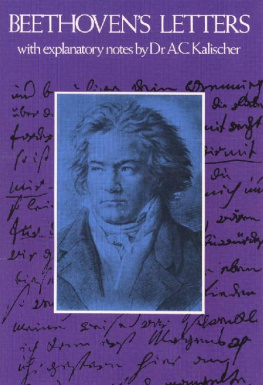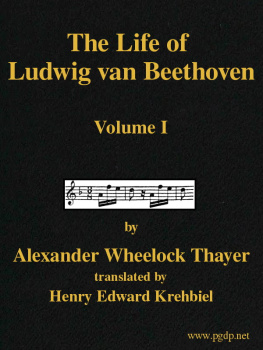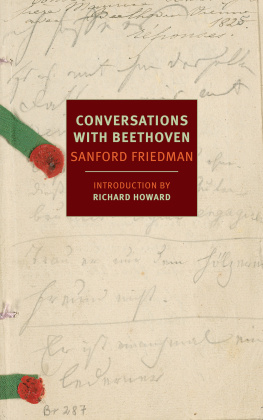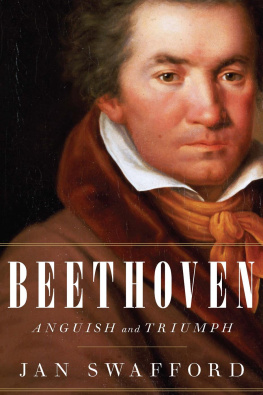Routledge Revivals
Ludwig van Beethoven
Ludwig van Beethoven
Harvey Grace
First published in 1927 by Kegan Paul, Trench, Trubner & Co., Ltd.
This edition first published in 2018 by Routledge
2 Park Square, Milton Park, Abingdon, Oxon, OX14 4RN
and by Routledge
711 Third Avenue, New York, NY 10017
Routledge is an imprint of the Taylor & Francis Group, an informa business
1927 by Taylor & Francis
All rights reserved. No part of this book may be reprinted or reproduced or utilised in any form or by any electronic, mechanical, or other means, now known or hereafter invented, including photocopying and recording, or in any information storage or retrieval system, without permission in writing from the publishers.
Publisher's Note
The publisher has gone to great lengths to ensure the quality of this reprint but points out that some imperfections in the original copies may be apparent.
Disclaimer
The publisher has made every effort to trace copyright holders and welcomes correspondence from those they have been unable to contact.
A Library of Congress record exists under ISBN: 27012280
ISBN 13: 978-1-138-60199-4 (hbk)
ISBN 13: 978-1-138-60205-2 (pbk)
ISBN 13: 978-0-429-46261-0 (ebk)

Crayon Drawing of Beethoven by A. v. Kloeber, 1817 or 1818
BEETHOVEN
LUDWIG VAN BEETHOVEN
BY
HARVEY GRACE
Author of The Complete Organist; The Organ Works of Bach ;
The Organ Works of Rheinberger ; &c.
Dedication
Dear Sir Henry Wood,
There are many thousands of folk who owe their intimate knowledge of Beethoven's orchestral music very largely to your work at Queen's Hall, especially at the Promenade Concerts. I am one of them, and I therefore dedicate this book to you, with sincere respect and admiration.
HARVEY GRACE.
Author's Preface
The original intention was that this book should be entirely biographical. If it be true, however, that our main interest is (or ought to be) in what a composer did rather than in what he was, the truth applies especially to Beethoven, and above all at the present time. The scheme of the book has therefore been modified so as to include a survey of his work. An attempt to make such a survey cover the whole of Beethoven's output would result in little more than a catalogue, with annotations so brief as to convey hardly anything of the essential quality of the music. It seemed, therefore, that the limited space would be best used, and the needs of the general reader more fully met, by a much less rigid and comprehensive method. My aim has been to indicate some, at least, of the more important characteristics of Beethoven's works, and to show their influence on his successors. If the adoption of a somewhat discursive style needs justification, one might suggest an analogy with certain musical forms, in which material that at first seems to be irrelevant often ends by throwing unexpected light on the main theme and so increasing its significance.
In regard to the biographical section I am aware that the devout Beethovenite may regard certain passages as lse majest. But any disposition I may have felt towards toning down certain unhappy traits in Beethoven's character was checked by reading some recent books and articles which, ignoring facts now well known and beyond dispute, presented once more the traditional and totally false picture of him.
But what is a biography for, if not to tell us the truth? "Let us have one thing or the other," says Ernest Newman on this point, "either a true account of the man, or no account at all. But do not let us say that because Beethoven wrote the ninth Symphony it is right for a biographer to tell us how kind he was to his nephew, but wrong to tell how he fibbed over the state of his finances in his latter years."
In fairness, I end with a confession: For some years I had been affected by the prevalent anti-Beethoven chill, and, like my fellow-sufferers, had come to regard him as an over-rated composer. So strong was this feeling that I hesitated long before undertaking to write this book. As a result of nearly three years spent on the task, which involved a close study of his music, including much that I have never heard during a long experience of concert-going, I am once more an enthusiast.
If this were merely a personal matter it would not be mentioned. I refer to it because there are at present many thousands who are wavering in their old allegiance. I am confident that they have only to approach Beethoven's work anew, scrapping all the ready-made opinions on it, and, above all, enlarging their acquaintance with the later chamber music, in order to become converted from waverers into discriminating enthusiasts.
In the preparation of this work I have been helped in a hundred ways by one whose cooperation must be warmly acknowledged, even though she happens to be my wife. I have also to thank Mr. Robert Lorenz for kindly reading the proofs.
Wareside, Herts.
1927.
LUDWIG VAN BEETHOVEN
LUDWIG VAN BEETHOVEN was born at Bonn on December 16th, 1770, of a consumptive mother and a drunken father; his paternal grandmother was also a dipsomaniac, and spent the last few years of her life as a compulsory abstainer in a convent. The painful facts concerning his parentage are set out at the very beginning of this book, because a just estimate of the man and his work is possible only when his terrible handicap is borne in mind. It warped his outlook, soured his temper, adversely affected his work both in quality and quantity, and no doubt shortened his life, for he died at fifty-seven, when his creative power was at its height.
The family was of Belgian origin, the first traceable members living near Louvain, whence one of them removed to Antwerp in 1650.
The composer's grandfather, Louis, ran away to Louvain to take up an appointment as bass Louis Beethoven had much of the forceful personality that showed itself later in his grandson. He was an excellent musician, and a man of marked integrity. Ludwig had grounds for claiming a physical likeness to him, for Wegeler tells us that the grandfather was dark-complexioned, short of stature, muscular, "with extremely animated eyes"a description which fits the grandson in adult years. Though he died when Beethoven was little more than three years old, he left so vivid an impression on the child that his portrait was treasured and his memory honoured throughout the composer's life.
Johann, Beethoven's father, was a tenor in the Royal Choir, an appointment he no doubt owed to the paternal influence. He was tall and handsome, vain and weak in character, irregular in habit, and only moderately endowed in voice and musicianship. His wife was an estimable woman and a typical hausfrau , "much occupied with sewing and knitting," but with too little force of character to influence the thriftless Johann. The utmost she could do, apparently, was to refuse to pay his drinking debts. One of the few happy features of the family life was the tender feeling that always existed between her and her son. A lodger in the Beethoven house gives us a pleasant picture of a domestic celebration in her honour:





